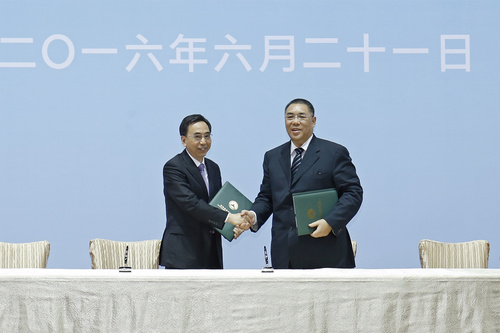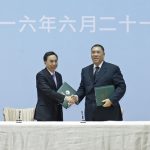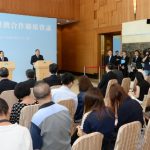 Chief Executive Mr Chui Sai On cordially shakes hands with Governor of Guangdong Province Mr Zhu Xiaodan before the 2016 Guangdong-Macao Cooperation Joint Conference, held at the Macao East Asian Games Dome.
Chief Executive Mr Chui Sai On cordially shakes hands with Governor of Guangdong Province Mr Zhu Xiaodan before the 2016 Guangdong-Macao Cooperation Joint Conference, held at the Macao East Asian Games Dome.
The Government will step up efforts – jointly with the Guangdong Government – for the development of the “Belt and Road” Initiative, said the Chief Executive, Mr Chui Sai On, at today’s 2016 Guangdong-Macao Cooperation Joint Conference. The cooperation will include exploring development opportunities available in the countries and regions covered by the Silk Road Economic Belt and the 21st Century Maritime Silk Road (known as the “Belt and Road” Initiative). The Guangdong Government and the Macao Government would jointly seek to enhance trade and investment – under the principle of “One country, two systems” – in order to create a greater number of urban communities of world-class standard. The routes for cooperation were covered in a Letter of Intent – signed at today’s meeting – between Guangdong Province and the Macao Special Administrative Region regarding joint participation in the development of the “Belt and Road” Initiative. A formalised system for communication between Guangdong’s Hong Kong and Macao Affairs Office and the Chief Executive’s Office will facilitate such work. The Government was also setting up a committee to coordinate Macao’s contribution to the “Belt and Road” Initiative, said Mr Chui. The 2016 Guangdong-Macao Cooperation Joint Conference was held during the morning, at the Macao East Asian Games Dome. At this year’s edition of the conference, the Guangdong Government and the Macao Government signed a total of 12 agreements that will further cooperation in the coming year. During the meeting, the Secretary for Economy and Finance, Mr Leong Vai Tac, and the Vice Governor of Guangdong, Mr He Zhongyou, gave a summary of the achievements made in cooperation between the two places during the past year. They included in particular, seizing the development opportunities arising from: the country’s 13th Five-Year Plan; from the “Belt and Road” Initiative; from the Guiding Opinions of the State Council on Deepening the Cooperation Within the Pan-Pearl-River Delta Region; and from the specification of Macao’s administrative role in relation to its nearby waters. Such forms of cooperation would also create opportunities to help diversify the city’s economy and assist in the process of transforming Macao into a world centre of tourism and leisure, and a commercial and trade cooperation service platform between China and the Portuguese-speaking countries (collectively known as the “Centre and Platform” policies), said Mr Chui. Leading a Guangdong Government delegation at the meeting, the Governor of Guangdong Province, Mr Zhu Xiaodan, said Macao’s network of contacts in the Portuguese-speaking countries would bring a new dimension to Guangdong-Macao cooperation and the development of the “Belt and Road” Initiative. Strategies to facilitate the development of the “Belt and Road” Initiative included: the development of “Dawan area” – a logistics hub in coastal areas encompassing Guangdong, Hong Kong and Macao; support to enable a greater number of companies in Guangdong and Macao to invest in the countries and regions along the routes of the “Belt and Road” Initiative; and intensification of cooperation on tourism-related matters between Guangdong and Macao, in order to expand that economic sector’s cooperation with countries and regions covered by the “Belt and Road” Initiative. During a session with the media after the meeting, Mr Chui stated that the Government is paying close attention to public opinion on a range of issues, while at the same time developing cooperation with the Guangdong Government. With regard to matters relating to the nuclear power plant in Guangdong’s Taishan Prefecture, the Government was in regular contact with the Guangdong authorities – via a mechanism established for that purpose – in order to address in a timely manner any public concern that might arise. The highlights of the cooperation plans announced at the 2016 Guangdong-Macao Cooperation Joint Conference were: - to complement the functions of the Guangdong Government and the Macao Government in order to further the development of the “Belt and Road” Initiative and to facilitate the ability of companies in Guangdong and Macao to ‘go global’; - to advance exchanges and cooperation between young people in Guangdong and Macao, and to support entrepreneurship by young people; - to make better use of opportunities arising from the Guangdong-Macao liberalisation in trade and services and from development on the mainland: consequently, Guangdong-Macao cooperation will take a greater role in the development of pilot free trade zones and in further liberalisation in trade and services, and there will be greater financial participation by Macao in key projects in Guangdong; - to promote the development of Hengqin New Area in Guangdong’s Zhuhai Prefecture; - to promote the China (Guangdong) Pilot Free Trade Zone; - to seek greater partnership with economic development projects in Nansha in Guangzhou, in Cuiheng in Zhongshan, and in Daguang Bay in Jiangmen; - to bolster cooperation on improving the well-being of the communities involved; - to promote simplification of boundary crossing procedures; - to advance cooperation on tourism matters; - to help promote technical and professional sectors within the communities involved;. - to bolster communication between task forces set up for Guangdong-Macao cooperation, and; - to enlarge the roles of non-governmental think tanks in the two places, in order to inspire further cooperation. The 12 agreements signed today were: - the Letter of Intent between Guangdong Province and Macao SAR for joint participation in the development of the “Belt and Road” Initiative; - the Framework Agreement between the Government of the Macao SAR and the Zhongshan Municipal People's Government regarding the promotion of innovative projects and entrepreneurship among young people; - the Cooperation Agreement on strengthening exchanges between young people in Guangdong Province and the Macao SAR; - the Cooperation Protocol between Guangdong Province and the Macao SAR on the study and implementation of the model “one exam, multiple certificates”; - the Cooperation Agreement between Guangdong Province and the Macao SAR on the creation of a task force for the development of the China (Guangdong) Pilot Free Trade Zone; - the Framework Agreement between the Macao SAR and the Jiangmen Municipal People's Government on the development of Daguang Bay Economic Zone in Jiangmen; - the Memorandum of Cooperation on the Guangdong development fund for Guangdong-Macao cooperation; - the Framework Agreement on cooperation between Guangdong Province and the Macao SAR regarding traditional Chinese medicine; - the Memorandum of Cooperation between Guangdong Province and the Macao SAR on exchanges regarding medical affairs and health; - the Agreement on entry to Hengqin of vehicles registered in the Macao SAR; - the Cooperation Arrangement among Guangdong-Hong Kong-Macao search and rescue authorities for mutual recognition of "plans for cooperation between search and rescue services and regarding passenger ships"; and; - the Memorandum of Cooperation on Guangdong-Macao tourism cooperation. The Guangdong-Macao Cooperation Joint Conference mechanism was established in 2003, with six priority projects for cooperation between the two places, including in the services sector, the Zhuhai-Macao Cross-border Industrial Zone, and research on the joint development of Hengqin.
View gallery


